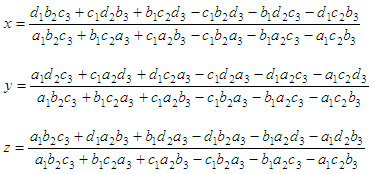

Cramer's RuleThe method of solution of linear equations by determinants is called Cramer's Rule. This rule for linear equations in 3 unknowns is a method of solving -by determinants- the following equations for x, y, za1x + b1y + c1z
= d1
a2x + b2y + c2z = d2 a3x + b3y + c3z = d3

assumed
not equal to zero, then we may re-write the values as
That is, for the first variable, you substitute the first column of the determinant with the constants on the right; for the second variable, you substitute the second column with the constants on the rigth, and so on... Example: Solve
this system using Cramer’s Rule 2x + 4y
– 2z = -6 For x,
take the determinant above and
replace the first column by the constants on the right of the system.
Then,
divide this by the determinant: 

You
just solved ths system! In
Matlab, it’s even
easier. You can solve the system with just one instruction. Let D
be the matrix
of just the coefficients of the variables: D =
[2 4 -2; Let b
be the column vector
of the constants on the rigth of the system : b = [-6 8 12]'; % the apostrophe is used to transpose a vector Find the
column vector of the unknowns by 'left
dividing' D
by b (use
the backslash), like this: variables = D\b And Matlab response is: variables
= From 'Cramers Rule' to 'Linear
Algebra'
|





